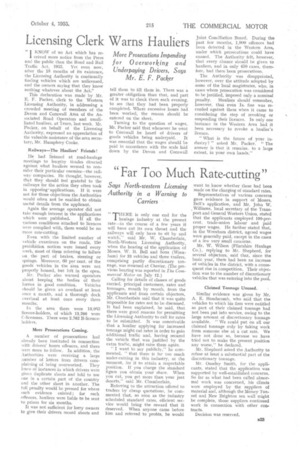Licensing Clerk Warns Hauliers
Page 37

If you've noticed an error in this article please click here to report it so we can fix it.
" I KNOW of no Act which has re ceived more notice from the Press and the public than the Road and Rail Traffic Act, 1933. Yet even now, after the 18 months of its existence, the Licensing Authority is continually finding vehicles which are unlicensed, and the owners saying that they know nothing whatever about the Act."
This declaration was made by Mr. E. F. Packer, clerk to the Western Licensing Authority, in addressing a crowded meeting of members of the Devon and Cornwall Area of the Associated Road Operators and unaffiliated hauliers, at Truro, last week, Mr. Packer, on behalf of the Licensing Authority, expressed an appreciation of the valuable assistance of the area secretary, Mr. Humphrey Cooke.
Railways—The Hauliers' Friends !
He had listened at road-haulage meetings to lengthy tirades directed against what hauliers seemed to consider their particular enemies—the railway companies. He thought, however, that they should feel grateful to the railways for the action they often took in opposing • applications. If it were not for those objections the Authorities would often not be enabled to obtain useful details from the applicant.
Again the average operator did not take enough interest in the applications which were published. If all the various conditions attached to licences were complied with, there would be no more rate-cutting.
Even with the limited number of vehicle examiners on the roads, 150 prohibition notices were issued every week, most of them referring to failure on thepart of brakes, steering or springs. Moreover, 60 per cent, of the goods vehicles in the area were not properly housed, but left in the open.
Mr. Packer also warned operators about keeping the bodies of their lorries in good condition. Vehicles should be given an overhaul at least once a month, and a thorough dock overhaul at least once every three months.
In the area there were 18,063 licence-holders, of which 13,266 were C-licensees. There were 2,762 B-licenceholders.
More Prosecutions Coming.
A number of prosecutions had already been instituted in connection with drivers' hours offences, and there were more to follow. In addition, the Authorities were receiving a large number of letters from drivers complaining of being overworked. They knew of instances in which drivers were given duplicate sheets and told to use one in a certain part of the country and the other sheet in another. The all penalty would be pressed for where such evidence existed ; for such offences, hauliers were liable to be sent to prison for six months.
It was not sufficient for lorry owners to give their drivers record sheets and tell them to fill theta in. There was a greater obligation than that, and part of it was to check them each evening, to see that they had been properly completed. Where excessive hours had been worked, the reason should be entered on the sheet.
Turning to the question of wages, Mr. Packer said that whenever he went to Cornwall he heard of drivers of goods vehicles being underpaid. It was essential that the wages should be paid in accordance with the scale laid down by the Devon and Cornwall Joint. Conciliation Board. During the past few months, 1,900 offences had been detected in the Western Area, under which prosecutions could have ensued. The Authority felt, however, that every chance should be given to hauliers, and in only 450 cases, therefore, had there been prosecutions.
The Authority was disappointed, however, over the attitude adopted by some of the local magistrates, who, in cases where prosecution was considered to be justified, imposed only a nominal penalty. Hauliers should remember, howeVer, that even Is. fine was recorded against them when it came to considering the step of revoking or suspending their licences. In only one instance in the Western Area had it been necessaiy to revoke a haulier's licence.
" What is the future of your industry ? " asked Mr. Packer. "The answer is that it remains, to a large extent, in your own hands."




























































































